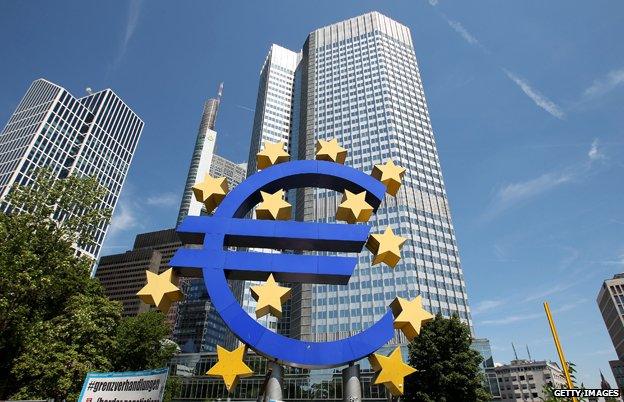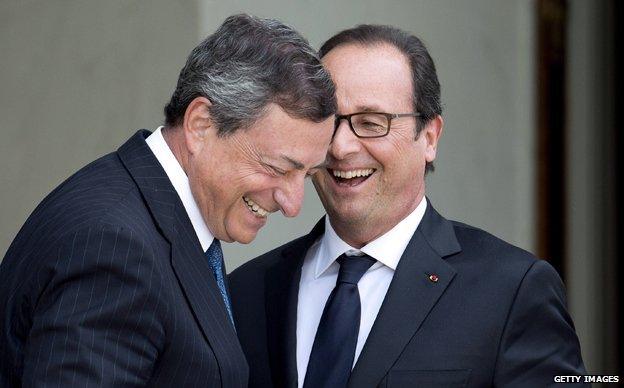The growing threat to our recovery
- Published
- comments

I've returned from my short break to a world that looks pretty messy - and (very sorry) I am suffering from a degree of trepidation at the start of the new school term (and that's not just because of my beloved Arsenal's traditionally erratic start to the new season).
Let's start with a bit of cheery news: Japan is showing signs of breaking free from two decades of stagnation in pay; wages in July rose at their fastest pace for more than 17 years, and they have been increasing for five months.
Just maybe Japan's pernicious deflationary pressures are easing.
But that may be a new version of Japanese exceptionalism, because the same cannot be said of a far more important market for British firms - the eurozone, where deflationary pressures remain a concern.
The German and Italian economies are shrinking, and France is flat-lining (in case of interest, I am making a documentary about whether France can ever again afford "le good life").
Unemployment remains hideously, intractably high - 11.5% for the eurozone as a whole.
And the nature of the eurozone's latest malaise makes it less amenable than hitherto to short-term fixes.
Or, to put it another way, when the eurozone was on the brink of fracture and Armageddon three years ago, it could be salvaged by a European Central Bank promising to flood broken banks with cheap money.
Eurozone banks remain damaged. But the eurozone's problems have matured (ahem) and are now rather less due to the hobbled nature of the banking system - as the European Central Bank's president Mario Draghi made clear in his gloomy tour d'horizon at the annual Jackson Hole shindig of central bankers a few days ago.
If businesses and consumers aren't investing and spending enough across the Channel, part of that - in countries like Italy - is that the cost of bank finance remains a bit elevated.

Francois Hollande shares a lighter moment with Mario Draghi
But the more fundamental and important problem is that animal spirits are depressed: households won't spend because they fear for their livelihoods and businesses won't invest because they don't have confidence that demand for their goods and services is on a sustainable rising path.
What is required, as Draghi implied, are reforms of labour and product markets in Italy and France, to make their economies more flexible and competitive, and a government-induced stimulus in Germany.
Neither look very likely right now: Mrs Merkel in Germany still does not wish to bail out other countries seen as profligate; governments in Italy and France hate the politics of shrinking the state and attacking entrenched working practices.
What's more the European Union's stand off with President Putin over his military support for separatists in Eastern Ukraine raises the spectre of a winter of uncertain EU access to vital supplies of Russian gas and a complete hiatus in Russian buying from the EU.
None of which is to say that the European Central Bank has been completely neutered. But it does mean that further details it will give of plans to cut the cost of money at its monthly press conference on Thursday are just more pain suppressors - they aren't any kind of fundamental cure for the euro area.
This tension, between what's good for the global economy and domestic political imperatives, seems as pernicious as ever.
This rubric may to some extent explain Putin's apparent desire to rebuild a Greater Russia: are his forays in Ukraine an attempt to shift attention away from a failure to channel the income from vast energy wealth into modernising the economy and improving its capacity to deliver rising living standards?
In China, an economic slowdown caused by the imperative of tackling a dangerous debt bubble - what I've discussed in this column as the important third-phase of global rebalancing - has not made the government any more tolerant of a hunger in some parts, especially Hong Kong, for greater economic freedoms.
And if the conflict between the authorities and Hong Kong protesters were to intensify, that would not be happy for any of us (I am making the assumption here, which not everyone accepts, that democracy is a firmer base for rising prosperity than autocracy).
As for hideous conflicts in Syria, Iraq, Israel, Gaza and Libya, the whole of the Middle East looks perilously close to the worst conflagration in living memory. And if that doesn't lead to higher energy prices and a general sense of unease that undermines economic activity, then history is no reliable guide at all.
None of which means that the great British and American economic revivals are dead yet.
But it does suggest that the momentum of growth will have to continue to be largely provided by consumption and domestic demand, rather than accelerating exports and investment.
And in the case of the UK in particular, that would yield a rather shorter date to the end of this rapid phase of recovery - because (and you really don't need me to tell you this) neither indebted UK consumers and a high-borrowing British government have the wherewithal to spend as if there's no tomorrow (we tried that; it wasn't an especially happy experience).